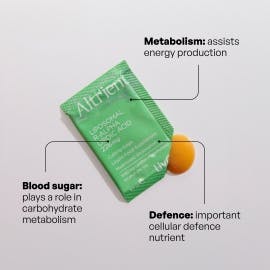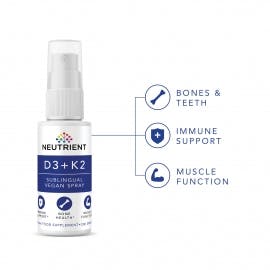Sick of being SAD in the winter - Could Alpha Lipoic Acid be the missing link?
What is Alpha Lipoic Acid (ALA) and where does it fit in with conventional treatments for Seasonal Affective Disorder (SAD)?
If you’re someone that’s affected by this debilitating condition when winter closes in and the dark clouds of gloom descend - it’s important to gather together as many coping strategies as you can to survive the dark days.
Adding ALA to your feel-good toolkit may be the final key to banishing the winter blues…
SAD facts
SAD commonly occurs in winter and affects millions of people every year. The change in season can have a dramatic effect on the mental health of many SAD sufferers but may only cause subtle changes in the mood and behaviour of others.
Typical symptoms of SAD
Low mood and depression are common but other symptoms include:
- Poor concentration and memory
- Lethargy and sleep problems
- Irritability and intolerance to stress
- Anxiety and inability to cope with day-to-day life
- Low sex drive
- Carbohydrate and sugar cravings
Possible causes of SAD
SAD appears to be caused by light deprivation. Cold weather forces us to stay inside and the days are shorter overall giving us less access to daylight.
SAD is particularly prevalent in people living in the Northern hemisphere with symptoms usually starting in September and October. However, those living 30 degrees from the equator where days are long and hot are rarely affected.
Studies have found a link between low vitamin D status and depression, which may explain why SAD occurs during the winter as our skins need exposure to sunlight to manufacture vitamin D in the body.
Reduced levels of important mood raising neurotransmitters such as serotonin have also been suggested as a contributing factor in SAD. The many complexities of brain chemistry mean that any imbalance in neurotransmitters can affect our brain function and subsequent moods.
Nutrition advice
Overall brain support will help reduce many of the symptoms of SAD. Every day we learn about ‘Super nutrients’ that can promote optimum brain health. There are lots to choose from but Alpha Lipoic Acid comes up time and again as a key nutrient and should be top of the list as part of your strategy for dealing with the symptoms of SAD.
What is ALA and how does it help with SAD?
- ALA is a really powerful antioxidant which counters the effects of highly reactive and harmful chemicals known as free radicals. These are capable of inflicting damage on DNA, proteins and the fats within our cell membranes, potentially resulting in memory, concentration and mood problems.
- ALA regenerates other antioxidants such as glutathione and vitamin C, providing significantly enhanced effects for fighting oxidative stress on the brain.
- ALA functions in both fat and water-soluble substances reaching watery areas like the blood and cell contents, as well as the cell’s outer membrane, which consists mostly of fat. This gives ALA a distinct advantage, allowing it to protect virtually all body tissues against free radical damage.
- There is good evidence that ALA can freely cross the blood-brain barrier, helping to keep the brain and nerve tissue healthy. Its powerful antioxidant activity can trap circulating heavy metals like mercury and lead - countering their toxic and carcinogenic effects, thereby preventing damage to brain cells.
- ALA may help to fight off the fatigue associated with SAD. It plays a key role in energy metabolism, working as an essential cofactor for several enzymes that generate energy production within the powerhouses in our cells.
- Brain inflammation is one of the key factors implicated in depression. Because ALA possesses such powerful antioxidant activity it can offer a uniquely efficient protective mechanism against the damaging effects of inflammation in the brain.
- More and more studies are identifying ALA as a potential therapeutic tool for the treatment of depression. Research has found that this vital antioxidant increases insulin sensitivity, which plays a role in the brain’s ability to increase serotonin synthesis, elevating feelings of happiness and wellbeing.
Lifestyle options
There are a variety of ways to tackle the symptoms of SAD but like many conditions, you may need to tailor your treatments to find therapeutic approaches that suit you personally. Finding the missing jigsaw pieces could be the answer to years of miserable winters.
Try these:
Exercise
Boring, I know, but exercise is often the key to recovery in many health conditions and SAD is no exception…Regular exercise really helps to improve mood and boosts energy and is particularly helpful if you do it outside to make the most of the natural sunlight. Studies suggest it elevates the feel-good hormones in the brain and packs a double punch if teamed up with a good dose of daylight.
Re-Assess your diet
Instead of indulging in comfort carbs and sugary treats, change to foods like turkey, cottage cheese, bananas, chicken and avocado. These are great sources of the amino acid tryptophan, which helps the brain produce happy hormones.
Additionally, these foods are packed full of protein, which if eaten instead of succumbing to processed carbohydrates, may help to keep blood sugar levels balanced - reducing fatigue, irritability and sugar cravings.
Make sure you get enough vitamin C and B complex vitamins. Low levels of these vital nutrients can affect mood and energy levels. A diet packed with fruit and vegetables is the key. However, well-absorbed supplements can bridge the gap if your diet is sometimes lacking - be sure to choose liposomal products for guaranteed results.
Venture Out
Spend as much time as possible during winter outside to maximise your exposure to sunlight and stimulate the production of vitamin D in your body. If howling winds and relentless rain are putting you off, now could be the time to pack your bags and head for sunnier climes.
Invest in a ‘SAD’ lamp
Many SAD sufferers find light therapy lamps invaluable during the winter months. Evidence suggests they help to reset the body’s own natural sleep/wake cycle, which can be disrupted in those prone to SAD.
Hopefully, with the help of a few carefully chosen nutrients and some lifestyle changes, winter will be a season to enjoy and not to hide from.
Jacqueline Newson BSc (Hons) Nutritional Therapy



.jpg?auto=format&q=45&w=262&trim=auto)
.jpg?auto=format&q=45&w=262&trim=auto)
